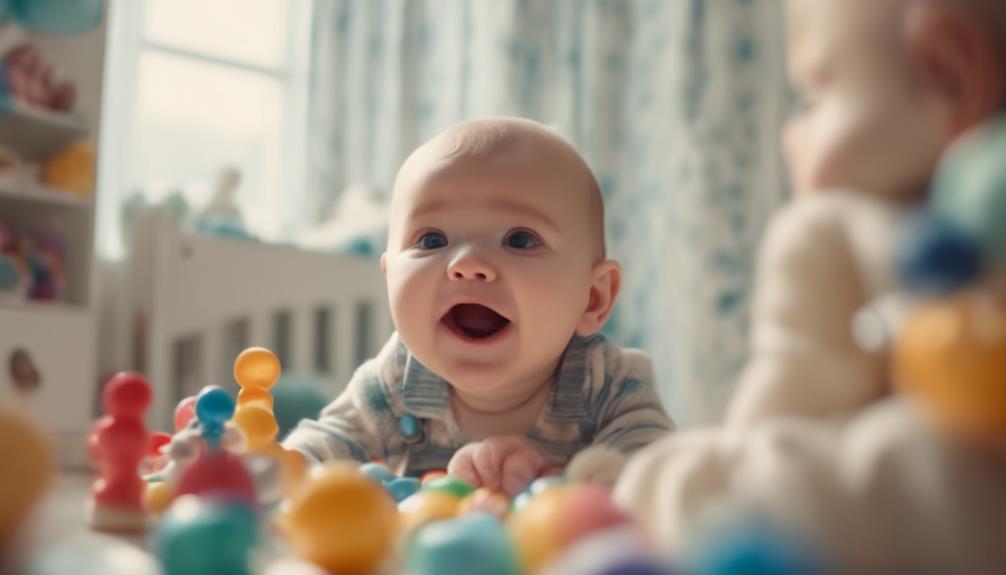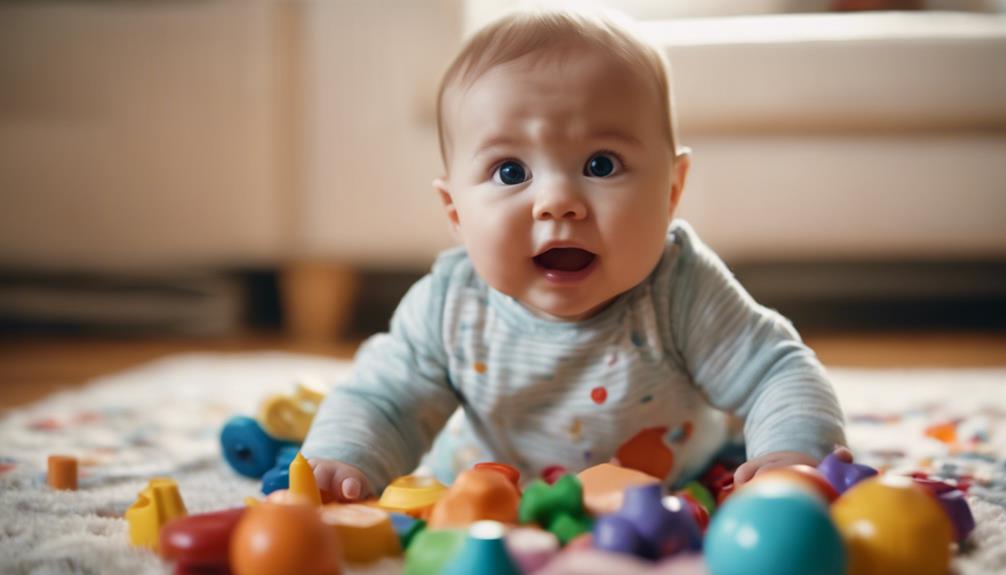At 6 months, your baby achieves important cognitive milestones, actively engaging with the environment through hands-on and mouth exploration. Object permanence begins to develop, allowing for anticipation and the building blocks of memory. Understanding cause and effect emerges, improving problem-solving skills. Toys such as rattles and mobiles can help strengthen memory and focus. Establishing consistent routines can support cognitive development, while toys that demonstrate cause and effect can encourage critical thinking. Interactive games and picture books can further aid in cognitive growth. Encourage exploration with a variety of textured toys to help foster problem-solving abilities. Interaction and play are crucial for cognitive and social development, supporting language acquisition. Your baby will flourish with engaging and stimulating activities.
Key Takeaways
- Exploration of surroundings with hands and mouth enhances cognitive growth.
- Object permanence games improve memory and understanding of hidden objects.
- Cause and effect toys aid in developing problem-solving skills and critical thinking.
- Stimulating toys like rattles and mobiles support cognitive development.
- Interaction, play, and consistent routines are crucial for cognitive and social development.
Cognitive Milestones at 6 Months
By six months, your baby reaches significant cognitive milestones, such as transferring objects between hands and exploring their surroundings with curiosity. At this stage of development, your baby's cognitive abilities are rapidly advancing. They're becoming more aware of their environment and are actively engaging with it using their hands and mouth. This exploration is an essential part of their cognitive growth, as it helps them understand the world around them.
As your baby reaches this age, they start to develop a sense of self-awareness and begin to learn about their own capabilities and preferences. This self-discovery process is critical for their cognitive development.
Object Permanence Development
How does a 6-month-old baby begin to demonstrate the concept of object permanence in their cognitive development? At around 6 months, babies start to understand object permanence, realizing that objects still exist even when they are no longer visible. This milestone is important as it marks the beginning of memory development and problem-solving skills. Peek-a-boo games, where objects or faces reappear after being hidden, can aid in reinforcing this concept. Here is a table summarizing the object permanence development milestones:
| Object Permanence Milestones | Description | Importance |
|---|---|---|
| Realization of hidden objects | Babies understand that objects remain present even when out of sight. | Foundation for memory and problem-solving |
| Anticipation of hidden objects | Babies start to expect the reappearance of hidden objects, showing memory skills. | Essential for cognitive growth |
| Search for hidden objects | Babies actively seek out hidden objects, demonstrating problem-solving abilities. | Encourages exploration and learning |
Understanding object permanence sets the stage for future cognitive processes like symbolic thinking and reasoning.
Memory and Attention Skills

At 6 months, your baby's memory is starting to bloom, allowing them to recall familiar faces, sounds, and objects from their experiences.
You may notice an improvement in your little one's ability to sustain attention, focusing on objects or activities for more extended periods as their cognitive skills progress.
Simple yet engaging activities like peek-a-boo can play an essential role in enhancing your 6-month-old's memory and attention skills through repetitive interactions.
Memory Development Milestones
Babies at 6 months old begin to show early signs of memory development by recognizing familiar faces, objects, and routines. Their memory milestones include the ability to remember and respond to their name, indicating an important memory recall ability.
At this age, infants may display interest in repetitive actions or games, showing signs of memory retention. Simple activities like playing peek-a-boo can aid in strengthening memory skills as babies anticipate actions and outcomes.
Repetition plays a significant role in memory development as infants start forming associations between actions and results. Encouraging interactions that involve repetition, such as reading the same book or singing familiar songs, can further support memory growth.
Attention Span Progress
As your 6-month-old baby's memory and attention skills continue to develop, their attention span progresses, allowing them to focus on objects or activities for short periods of time.
At this age, their memory skills are emerging, enabling them to remember familiar faces, objects, or routines. You may notice your baby showing interest in cause-and-effect relationships, indicating cognitive growth.
Simple interactive games like peek-a-boo can be beneficial in enhancing memory and attention skills in your 6-month-old. Repetitive activities or interactions play an essential role in strengthening memory retention and attention span.
It's common for babies at this stage to engage with their surroundings more actively, demonstrating a growing ability to concentrate on specific stimuli. Encouraging these behaviors through positive reinforcement and engaging activities can further support the development of their memory and attention skills.
Cognitive Stimulation Techniques
Engage your 6-month-old baby in interactive games and provide stimulating toys to enhance their memory and attention skills. Playing games like peek-a-boo not only strengthens memory but also helps in promoting longer attention spans. Using toys with various textures, colors, and sounds can significantly stimulate cognitive development and improve memory retention. Encouraging exploration by offering safe objects for your baby to touch, hold, and investigate can boost their cognitive skills and aid in reaching developmental milestones. Reading colorful picture books with large images and simple stories can assist in developing visual memory and increasing attention. Establishing a consistent routine with familiar activities supports memory formation and cognitive growth. Remember, each baby develops at their own pace, so be patient and provide a nurturing environment for them to explore and learn.
| Stimulation Technique | Benefits | Implementation |
|---|---|---|
| Interactive Games | Strengthen memory, promote attention span | Play peek-a-boo |
| Stimulating Toys | Enhance cognitive development, improve memory retention | Use toys with different textures, colors, and sounds |
| Reading Picture Books | Develop visual memory, increase attention | Read colorful books with large images |
Cause and Effect Understanding

Developing an awareness of cause and effect, your 6-month-old is beginning to understand how their actions lead to specific outcomes. This cognitive milestone marks the start of an important developmental phase where your baby starts to recognize the relationship between what they do and the results that follow.
You might observe your little one dropping a toy repeatedly to hear the sound it makes, showcasing their growing curiosity and experimentation with cause and effect scenarios. By making these connections, your baby is laying the groundwork for problem-solving skills and critical thinking abilities.
Understanding cause and effect not only shapes cognitive development but also enhances reasoning capabilities, fosters the ability to predict outcomes, and encourages exploration of the environment. Engaging your 6-month-old in activities that highlight cause and effect, such as playing with toys that produce sounds or light up in response to actions, can provide valuable support for their cognitive growth and understanding of the world around them.
Playful Cognitive Activities

Engage your 6-month-old in playful cognitive activities to stimulate their senses and foster development.
Encourage sensory exploration through toys with various textures, colors, and sounds.
Introduce object permanence games and cause-and-effect toys to enhance their cognitive skills further.
Sensory Exploration Through Play
Utilizing toys with varied textures, colors, and sounds can effectively stimulate the sensory exploration of a 6-month-old baby during playtime. Interactive toys play an essential role in engaging the baby's senses and promoting cognitive development.
Engaging in sensory exploration through play involves activities that encourage the baby to touch, feel, and explore different objects, aiding in the development of cognitive skills like object permanence and cause-and-effect relationships.
Interactive toys such as rattles, mobiles, and toys with mirrors are particularly beneficial for fostering sensory exploration in a 6-month-old baby. These toys provide a multi-sensory experience, capturing the baby's interest and encouraging them to interact with their environment actively.
Through sensory play, babies at this age can enhance their brain development by stimulating their curiosity and promoting exploration.
Object Permanence Games
Engaging in object permanence games with a 6-month-old can greatly enhance their cognitive development and foster a sense of curiosity and exploration.
Object permanence games involve hiding toys under cloths or blankets to help infants understand that objects continue to exist even when out of sight. By participating in these activities, babies are encouraged to search for and uncover hidden objects, promoting memory retention, problem-solving skills, and a grasp of cause and effect relationships.
These games can be as simple as concealing a toy under a cup or moving it behind a barrier for the baby to find. Playing object permanence games with a 6-month-old not only strengthens their cognitive abilities but also nurtures a natural inclination towards exploration and discovery.
These activities are crucial for the baby's cognitive growth, assisting them in developing essential skills that lay the foundation for more complex cognitive processes later in life.
Cause and Effect Toys
Playing with cause and effect toys at this stage can greatly enhance your 6-month-old's cognitive development by helping them grasp the relationships between actions and outcomes in a fun and interactive way. Cause and effect toys are essential in your child's developmental milestones as they promote critical thinking and problem-solving skills. These toys engage your baby's senses, encouraging exploration and understanding of how their actions lead to specific outcomes. Examples of cause and effect toys include pop-up toys, musical instruments, and light-up toys that respond to your baby's touch or movement.
Here is a table showcasing the benefits of cause and effect toys for your baby's cognitive development:
| Benefits of Cause and Effect Toys | ||
|---|---|---|
| Promote critical thinking | Encourage exploration | Enhance problem-solving skills |
| Engage sensory development | Stimulate curiosity | Foster understanding of the physical world |
| Encourage trial and error learning | Improve motor skills | Enhance cognitive growth |
Enhancing Cognitive Growth

To enhance your 6-month-old baby's cognitive development, focus on creating a stimulating environment that encourages exploration and interaction. At this stage, your child is reaching important cognitive milestones that can be further nurtured through engaging activities.
Interactive activities like reading books and playing peek-a-boo can stimulate their growing cognitive abilities. Providing a variety of toys with different textures, colors, and sounds won't only encourage exploration but also promote sensory stimulation, aiding in cognitive growth.
Talking to your baby frequently, describing objects and actions around them, will help enhance their language development, which is closely linked to cognitive skills. Additionally, offering simple puzzles or toys that require manipulation can encourage problem-solving skills, assisting in the development of cognitive abilities such as spatial awareness.
Importance of Interaction and Play

Interaction and play with your 6-month-old baby are key components in fostering cognitive development and social skills. Through interactive play, your baby's cognitive development is stimulated as they explore and engage with their surroundings. Engaging in play with you helps support language development, as your baby begins to mimic sounds and gestures. Activities like peek-a-boo and singing songs not only entertain but also enhance social interaction skills. Providing toys with various textures during playtime encourages sensory exploration, further promoting cognitive growth. Monitoring your baby's responses to different stimuli during play allows you to track their cognitive progress and developmental milestones effectively.
| Benefits of Interaction and Play for a 6-Month-Old Baby | ||
|---|---|---|
| Stimulates cognitive development | Supports language development | Enhances social interaction skills |
Frequently Asked Questions
What Is the Cognitive Development of a 6 Month Old Baby?
You're exploring the world! You use hands and mouth to learn, transfer objects, and maybe recognize yourself in the mirror. Sensory info helps you understand surroundings. Play, touch textures, and look at things for learning.
What Should a 6 Month Old Be Doing Developmentally?
You should be exploring with hands and mouth, reaching for objects, sitting with a little help, and recognizing familiar faces. Engaging in back-and-forth play, providing easy-to-pick-up toys, and encouraging exploration are important for your cognitive development.
How Developed Is a Baby's Brain at 6 Months?
Your baby's brain at 6 months is quite developed. It's rapidly forming connections, engaging in problem-solving skills, showing curiosity, exploring the world, and interacting socially. It's amazing to witness their growth!
What Is the Cognitive Development of a Baby?
You're diving deep into cognitive growth, absorbing knowledge like a sponge in a sea of learning. Your mind blossoms, grasping cause and effect, solving tiny puzzles, and cherishing memories. This journey shapes your future brilliance.
Conclusion
In summary, fostering the cognitive development of your 6-month-old baby is vital for their growth and learning. By engaging in interactive play, promoting object permanence, and supporting memory and attention skills, you can help your child reach important milestones.
Remember, every interaction and activity you engage in with your baby contributes to their cognitive development, setting a strong foundation for their future learning.
So, keep playing, engaging, and exploring with your little one to help them thrive and succeed.










